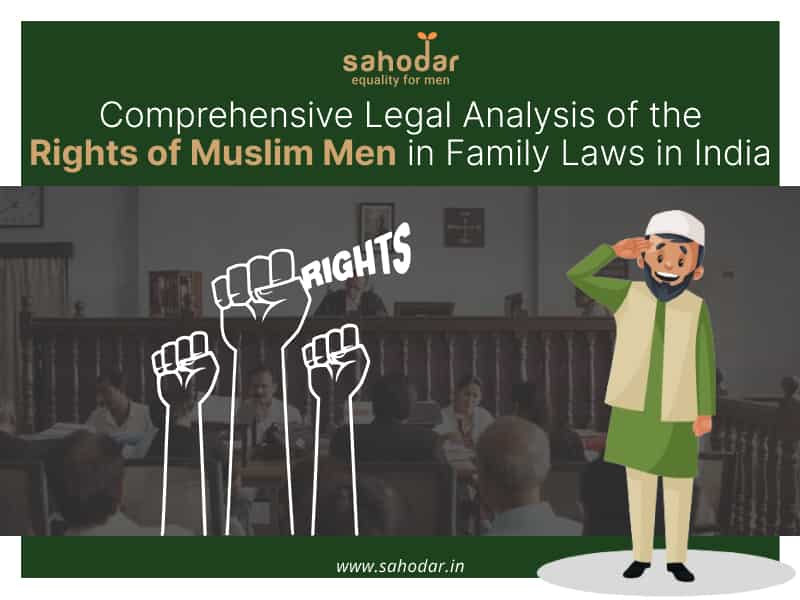India’s legal landscape is characterized by diversity, and this diversity extends to personal laws governing different religious communities. Within this framework, the Muslim Personal Law delineates the rights and responsibilities of Muslims, with a particular focus on the legal entitlements of Muslim men in familial and personal matters.
This comprehensive analysis aims to explore the nuanced legal aspects governing the rights of Muslim men under family laws in India.
Rights of Muslim Men in Marriage and Talaq
The foundation of Muslim family law lies in the institution of marriage, often referred to as ‘Nikah.’ It is a contractual relationship that outlines the respective rights and duties of the husband and wife. Muslim men in India hold the legal right to enter into this contract, and the terms are subject to negotiation, traditionally mediated by religious authorities. The provisions of ‘Talaq’ or divorce are embedded within this legal framework, allowing Muslim men to initiate divorce in accordance with the procedures stipulated by Islamic law.
Islamic jurisprudence mandates that the pronouncement of ‘Talaq’ should be a well-considered and deliberate act, with specific waiting periods and opportunities for reconciliation. This ensures a measured approach to the dissolution of the marital bond and reflects the legal gravity attached to such proceedings.
Maintenance and Mehr
Upon the dissolution of marriage, Muslim men are legally obligated to provide financial support to their former spouses, a concept known as ‘maintenance‘ or ‘Nafaqah.’ This support is designed to enable the divorced wife to maintain a standard of living consistent with the marital arrangement. The quantum of maintenance is determined based on factors such as the financial capacity of the husband and the needs of the wife.
Furthermore, the groom is legally required to provide a dower, referred to as ‘Mehr,’ to the bride at the time of marriage. This financial endowment serves as a form of financial security for the wife and constitutes her legal entitlement. The quantum of Mehr is agreed upon at the time of the marriage contract, often reflecting the financial status of the groom and the prevailing social norms.
Polygamy
Under Muslim personal laws in India, Muslim men possess the legal right to engage in polygamous unions, subject to certain conditions. The Quran permits a Muslim man to have up to four wives simultaneously, provided that he treats each wife with equity and justice. This practice, rooted in historical and cultural contexts, has been a subject of considerable scrutiny.
Critics argue that polygamy, as permitted under Islamic law, can lead to issues related to the equitable treatment of wives and may contribute to social and economic imbalances within families. Despite this, the legal right to practice polygamy remains protected under the Muslim Personal Law, and any potential reforms would require careful consideration of religious sentiments and constitutional principles.
Rights of Muslim Men in Child Custody
The legal provisions surrounding child custody after a divorce play a crucial role in shaping familial relationships. According to Muslim personal laws in India, the mother is generally granted custody of minor children, particularly daughters, until they reach a certain age. This legal presumption is rooted in the belief that mothers are best suited to provide nurturing and care to young children.
However, the father retains legal rights to visitation and access to the children, ensuring ongoing involvement in their lives. The age at which custody may transition to the father varies and is contingent on the specific circumstances of the case. The overarching principle is to prioritize the welfare and best interests of the children.
Inheritance
In matters of inheritance, the legal principles outlined in the Quran and Sunnah dictate the distribution of the deceased’s estate among heirs. Male heirs, including sons and grandsons, are entitled to a share that is traditionally double that of their female counterparts. This distribution is rooted in the Islamic concept of ensuring financial security for female heirs through the establishment of a protective framework.
The system of inheritance is complex, taking into account various factors such as the relationship of the heir to the deceased, the existence of other heirs, and the nature of the assets. Additionally, the deceased may have the option to bequeath a portion of their estate to individuals outside the predefined heirs, subject to certain limitations.
Conclusion:
In conclusion, the legal rights of Muslim men within the family laws of India are entrenched in a centuries-old framework shaped by Islamic jurisprudence. The rights pertaining to marriage, divorce, maintenance, polygamy, child custody, and inheritance are intricately interwoven with religious beliefs, cultural practices, and social norms. While these laws are intended to govern familial relationships within the Muslim community, they also intersect with broader debates on gender justice, individual rights, and the need for legal reforms.
The dynamism of society, evolving societal attitudes, and the imperative for gender equality have led to ongoing discussions regarding the potential need for reforms within the Muslim Personal Law. Balancing the preservation of religious freedoms with the imperative for gender parity poses a complex challenge that requires careful consideration by lawmakers, legal scholars, and the broader community.
As India continues to progress, it is incumbent upon the legal system to evolve in tandem with societal dynamics, ensuring that family laws remain just, equitable, and responsive to the evolving needs of diverse communities. Striking this delicate balance requires a nuanced understanding of both the legal intricacies and the socio-cultural context in which these laws operate. Ultimately, the rights of Muslim men within family laws in India are integral to the broader discourse on legal pluralism, individual rights, and the pursuit of justice in a diverse and multicultural society.

